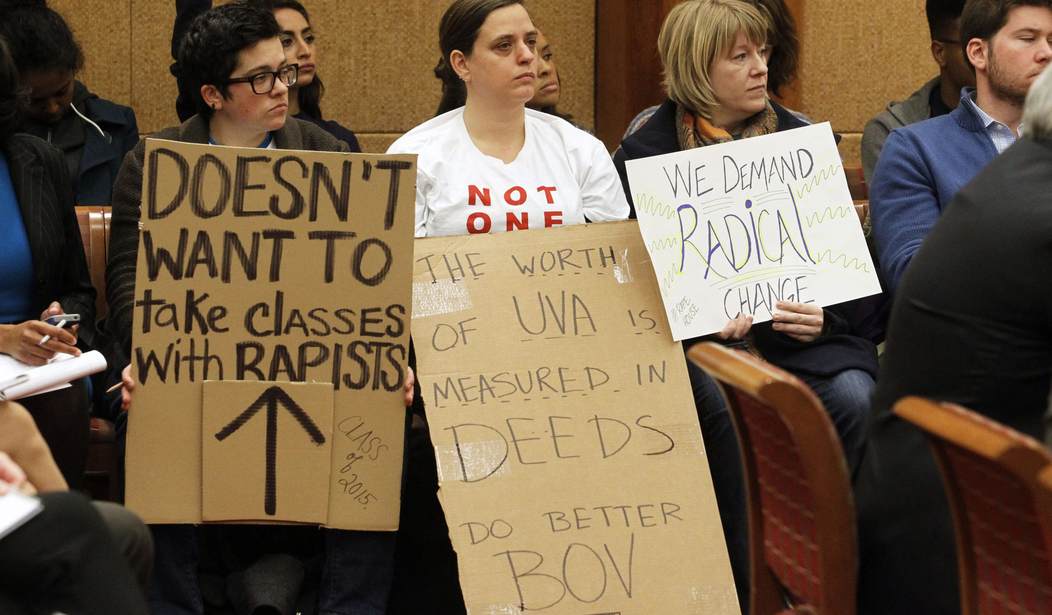Do young college men accused of sexual assault have a right to due process and a fair trial in the campus court system? Are students able to have a lawyer represent them? Can they present evidence, and cross-examine their accuser?
Unless the student lives in one of the three states (North Dakota, North Carolina, and Arkansas) that have passed due process affirming legislation, the answer is no. Students in all other states don’t have these rights — which means hundreds of students every year could be expelled for crimes they didn’t commit.
Due process advocates come from all corners of America. Prominent examples include Cynthia P. Garrett, a lawyer who advises the families of accused students in California, and Ashe Schow, a journalist from D.C. who tirelessly uncovers abuses of power in the campus court system.
But while many of the most prominent due process advocates are women, these advocates are still maligned by liberal activist-scholars such as Alexandra Brodsky.
Brodsky, a lawyer in private practice who graduated from Yale Law School, recently claimed that due process advocates are rooted in “misogyny” and “misinformation.”
You may remember Brodsky from the hype over claims that “stealthing” — nonconsensual condom removal — is on the rise. Brodsky published the seminal article on the issue in April, which, not surprisingly, didn’t find any actual evidence that rates of stealthing have risen.
On August 4, Brodsky published “A Rising Tide: Learning about Fair Disciplinary Process from Title IX” in Journal of Legal Education, where she claimed (counterintuitively) that Title IX campus court trials are fair for students accused of sexual assault — and further, that the police criminal system could learn from them.
The campus court system is so fair that due process advocates should “celebrate,” Brodsky says, since students accused of sex crimes have slightly more rights than students accused of, say, plagiarism:
One might think, then, that advocates for student due process would celebrate the expanded procedural rights available in gender violence disciplinary hearings.
Brodsky argues that due process advocates are ungrateful, despite the accused not being allowed an attorney or cross-examination.
Further, keeping in line with the liberal tradition of smearing due process advocates as rape apologists, Brodsky claims these well-meaning folks aren’t acting in “good faith”:
Some of the loudest voices decrying the treatment of students accused of gender violence appear deeply unconcerned with victims’ educations, having rooted their campaign in misogyny and misinformation about sexual assault.
It’s unclear who she’s referring to. Brodsky did not respond to a request for comment on the matter.
While it’s true that some men’s rights activists have taken their quest against false allegations too far (often resorting to victim blaming), the vast majority of advocates present reasoned arguments: see KC Johnson, Stuart Taylor, Ed Bartlett, Andrew Miltenberg, Ashe Schow, Janet Halley, Greg Piper, Cynthia P. Garrett, Samantha Harris, and others.
Brodsky, who co-founded a victims advocacy group, further argues that Title IX trials are “sensible” for both parties:
Rather than seeing Title IX as a threat to students’ procedural rights, then, [due process] advocates should see the law as a model for equitable, sensible disciplinary processes.
While the “rising tide” of Title IX trial regulation, which she claims lifts the boats of both the accused and the victim, remains entrenched, Brodsky argues that any further due process protections would be a threat to victims. Efforts to make schools use the “clear and convincing standard of evidence” (as opposed to the 50.01% standard currently in place) and to allow students the right to cross-examine their witness would threaten progress that’s been made, Brodsky claims.
Her essay, supportive of the Obama-era guidance that more than 100 mostly male students have filed lawsuits over, ends with a recapitulation of her dedication to survivors of sexual assault. With more policy supportive of victims, “fewer would be unjustly deprived of the opportunity to learn.”
PJ Media reached out to Brodsky multiple times for comment, but did not receive a response in time for publication.
Follow the author of this article on Twitter: @Toni_Airaksinen










Join the conversation as a VIP Member